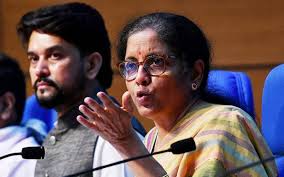Finance Minister Nirmala Sitharaman said there is a need to simplify rules in certain sectors, as she began the fourth tranche of announcements under the government’s Rs 20 lakh crore economic support program. Today’s measures are focused on structural reforms for sectors which will be new horizons for growth, Sitharaman said. She added that the Prime Minister’s Aatmanirbhar Bharatplan is intended to make India self-reliant but not inward-focused.
The government said that structural reforms will be focused on eight sectors. These include: Coal Minerals Defence Production Airspace management and maintenance Airports Power distribution companies in Union Territories Space Atomic Energy.
For the coal sector, the government said that commercial mining is being permitted. The move had been initiated earlier when the parliament passed the Mineral laws (Amendment) Bill in March 2020. The government will move towards a revenue sharing mechanism instead of fixed pricing, to ensure competition, transparency and encourage private sector participation. Coal Bed Methane extraction will also be auctioned. The government will spend Rs 50,000 crore to create evacuation facilities once coal is mined.
For the coal sector, the government said that commercial mining is being permitted. The move had been initiated earlier when the parliament passed the Mineral laws (Amendment) Bill in March 2020. The government will move towards a revenue sharing mechanism instead of fixed pricing, to ensure competition, transparency and encourage private sector participation. Coal Bed Methane extraction will also be auctioned. The government will spend Rs 50,000 crore to create evacuation facilities once coal is mined.
The government has raised the foreign direct investment limit for deference production under the automatic route to 74 percent from 49 percent. At present The government will also notify a list of weapons and platforms which will not be open for imports. Every year this list will be expanded, the finance minister said. A separate budget provision will be provided for local purchases, which will reduce the import bill of deference equipment, Finance Minister Niramala Sitharaman said. In addition, corporation of ordinance factory boards will be pursued.
The government has announced the opening up airspace availability and said that six more airports will be privatized. Only 60 percent of Indian airspace is freely available, said Finance Minister Niramala Sitharaman. Restriction on utilization of Indian airspace will now be eased. This will save Rs 1,000 crore in flying cost, she said. In addition, six more airports have been identified for privatization in the second round via the public-private partnership route. The government expects Rs 12,000 crore investment in the first and second round. The intention to do so was first announced last year. India will be developed as a hub of maintenance, repair and overhaul operations both for the private and the deference sector.
The government will take steps to privatize power distribution companies in union territories. Power departments and utilities in the territories will be privatized, Finance Minister Nirmala Sitharaman said. Inefficiencies of the distribution companies will not be allowed to hurt consumer, Sitharaman said, adding that power tariff reforms will be furthered. Measures such as power load shedding will be discouraged.
The government plans to enhance viability gap funding for social sector projects, Finance Minister Nirmala Sitharaman said. Viability gap funding will be increased from 20 percent to 30 percent of the project cost. The total outlay for this is Rs 8,100 crore.
The government will encourage private participation in the space sector, Finance Minister Nirmala Sitharaman said. The government will provide a level playing field for the private sector in satellite, launches and space-based services. The private sector will also be allowed to use ISRO facilities. In addition, future projects for planetary exploration will be open to the private sector.
The government also announced measures related to the atomic energy sector. Research reactor under public-private partnership model will be set up for the production of medical isotopes. The government will establish facilities in PPP mode to use irradiation technology for food preservation.




